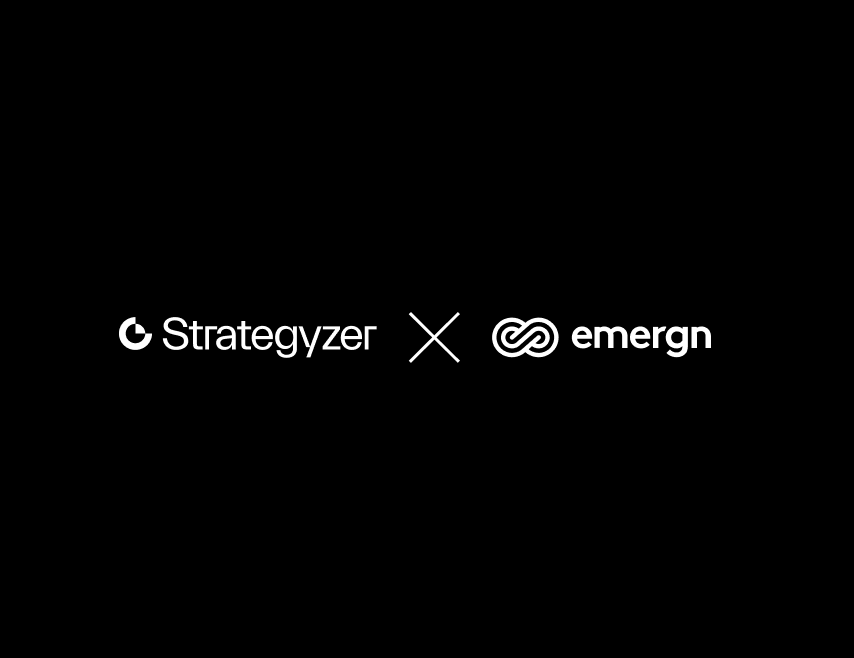The strategic alliance between Strategyzer and Emergn
The webinar began with an exciting announcement – the strategic alliance between Strategyzer and Emergn. Alex Osterwalder expressed his enthusiasm for this partnership and invited Alex Adamopoulos to speak about the origins of this collaboration.
Alex Adamopoulos traced the genesis of their partnership back to the early days of agile practices. He highlighted that while IT departments were introducing agile practices, true agility was often missing from the organization's DNA. The disconnect between innovation and product management was a significant issue they identified. This disconnect compelled them to think about how to effectively close the critical distance between the desire for change and the ability to make it happen.
They both shared the vision that by combining Strategyzer's Explore-Exploit model with Emergn's expertise in technology, product management, and transformation, they could offer a holistic solution to organizations.
The webinar shed light on the critical need for effective collaboration between innovators and product managers in today's business landscape. While many organizations make attempts to bridge the gap, there is often a lack of formalization and institutionalization. The nuances of collaboration vary based on factors like organization size and the type of innovation in question.
The alliance between Strategyzer and Emergn aims to address these challenges by providing a comprehensive solution that leverages the Explore-Exploit model and their respective expertise. This webinar was just the beginning of an exciting journey towards a more collaborative and innovative future.
Should product managers also lead innovation within your organization?
This question emphasized the dynamic role product managers play in innovation, with the agreement that their involvement is crucial. The conversation extended beyond roles, touching on the broader themes of transformation, mindset change, and the need for diverse approaches to different types of innovation.
The consensus from both speakers was a resounding yes. Both passionately supported the idea, emphasizing that product managers, especially those in leadership roles, should be integral to innovation conversations. While acknowledging the nuanced nature of the term "lead," he stressed the importance of having product managers at the decision-making table, influencing funding choices, and being active contributors to innovation discussions.
Different types of innovation: Alex O. added depth to the discussion by recognizing the different types of innovation and their relationship with product management. In the realm of efficiency and sustaining innovation (Exploit), product managers are natural leaders. However, for more transformative innovations, there may be a need for specialized teams and roles outside the product management domain.
Dual mindset: The concept of a dual mindset emerged, where product managers excel in efficiency innovations while acknowledging the necessity for diverse teams and mindsets for more radical innovations.
Transformation and mindset change: The discussion seamlessly transitioned to the critical role of transformation and mindset change in organizations. Alex A. shed light on key principles, emphasizing a shift from traditional practices to more agile and product-centric approaches. The importance of cultivating a culture of empowerment over control resonated strongly in driving successful transformation.
Does everyone actually need to be an innovator?
The discussion on whether everyone needs to be an innovator reveals a consensus that fostering a culture of innovation is essential. The discussion highlights the need for clear definitions, roles, and processes within innovation. It also underscores the importance of a dual mindset and a connection between innovation and decision-making. The example of the innovation event provides a practical demonstration of these concepts in action.
Alex Osterwalder shared a passionate belief that innovation should not be limited to a select few. He emphasized the need for creating a mindset space within organizations, allowing anyone with innovative ideas to participate. He advocated for clear processes and metrics that enable teams to innovate, receive funding, and, importantly, define metrics for project termination if they don't meet the criteria.
Alex Adamopoulos agreed with the idea of fostering innovation throughout the organization. However, he stressed the importance of defining what it means to be an innovator and the boundaries within which individuals can innovate. He highlighted the necessity of clarity in roles and responsibilities to avoid misconceptions. The discussion also touched upon the roles within innovation, suggesting that product managers can serve as guides in innovation rather than sole idea generators. There's a mention of innovation coaches, portfolio managers, and their roles in the innovation process, further emphasizing the need for defining these roles.
Clear language and visual tools: Both Alex O. and Alex A. acknowledge the importance of a shared and clear language within organizations. They highlighted the value of visual tools like The Business Model Canvas in making concepts explicit and enhancing collaboration.
Professionalism in innovation: Alex O. introduced the idea that innovation is becoming a profession with explicit roles and responsibilities. He highlighted the need for professionals, such as innovation coaches and product managers, to accompany the innovation process, ensuring its success.
Does transformation fail based on lack of leadership?
The discussion highlighted that leadership is a critical factor in the success of transformation efforts, but it also underscored the need for leaders to have a clear understanding of innovation and provide clear expectations to teams involved in the process. Effective leadership involves not only being involved in transformation but also equipping the organization with the right skills and capabilities.
Expectation management: Alex Adamopoulos highlighted the role of leadership in setting clear expectations for transformation efforts. He noted that sometimes the failure of transformation can be attributed to a lack of clear guidance and expectations for teams involved in the process.
Role of leadership: Alex Osterwalder mentioned that leadership is crucial for both driving transformation and innovation. He discussed the importance of leaders understanding the dual mindset of managing the core and inventing the future. Effective leadership involves managing the core business while also investing in innovation and exploring new opportunities.
CEO involvement: The conversation also touched on the level of CEO involvement in transformation efforts. While CEOs can play a significant role, it was acknowledged that equipping the organization with the right skills, capabilities, and understanding of innovation is essential for success.
Definition clarity: The participants discussed the importance of having clear definitions of terms like "product," "innovation," and "portfolio management." Clear definitions provide a foundation for effective transformation efforts.
Summary
The webinar shed light on the critical need for effective collaboration between innovators and product managers in today’s business landscape. While many organizations make attempts to bridge the gap, there is often a lack of formalization and institutionalization. The nuances of collaboration vary based on factors like organization size and the type of innovation in question.
The alliance between Strategyzer and Emergn aims to address these challenges by providing a comprehensive solution that leverages the Explore-Exploit model and their respective expertise. This webinar was just the beginning of an exciting journey towards a more collaborative and innovative future.
Watch the whole webinar above to learn more. To get a deeper understanding of the dual mindset organization, download the insight paper here. Don’t forget to subscribe to our newsletter below to stay up to date on future webinars.







